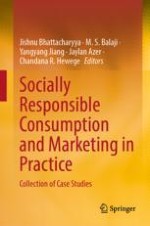2022 | OriginalPaper | Buchkapitel
A Case Study on Socially Responsible Consumption with Opportunities for Australian Clothing Retailers
verfasst von : Sardana Islam Khan, Michael Shaw, Priyantha Bandara
Erschienen in: Socially Responsible Consumption and Marketing in Practice
Verlag: Springer Nature Singapore
Aktivieren Sie unsere intelligente Suche, um passende Fachinhalte oder Patente zu finden.
Wählen Sie Textabschnitte aus um mit Künstlicher Intelligenz passenden Patente zu finden. powered by
Markieren Sie Textabschnitte, um KI-gestützt weitere passende Inhalte zu finden. powered by
